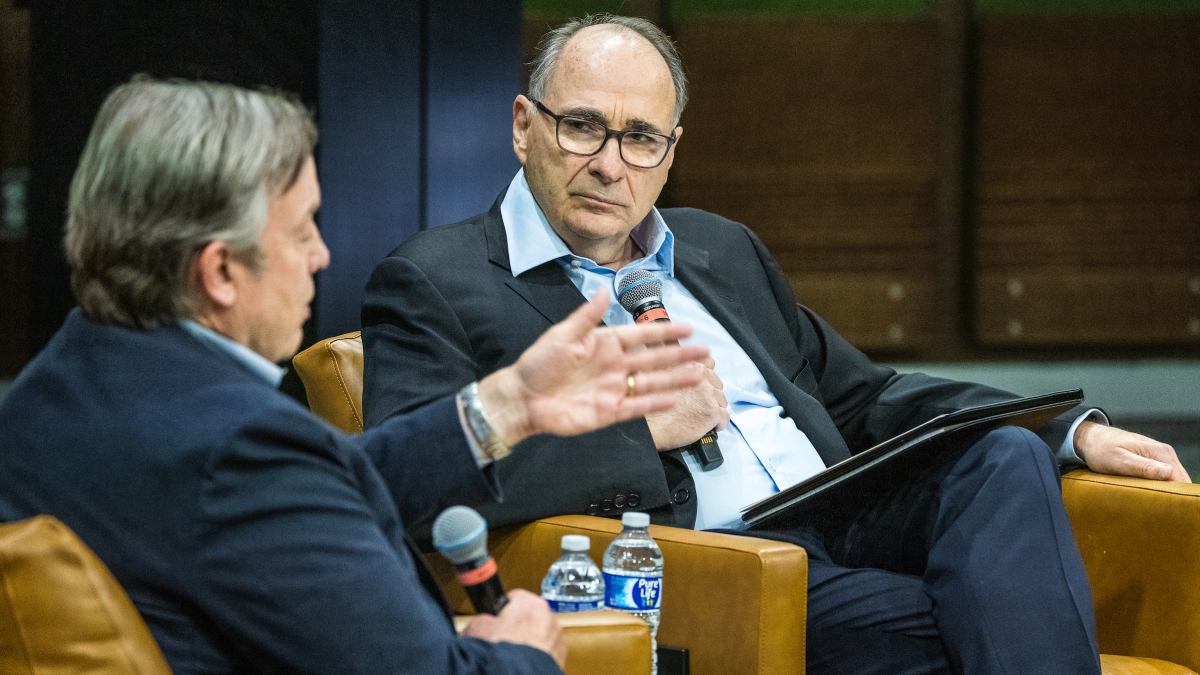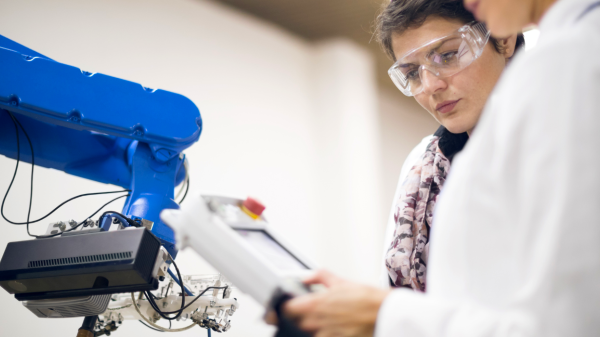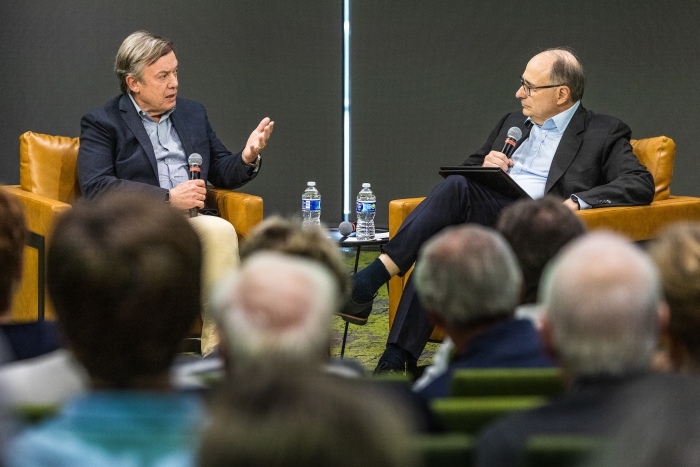Podcast host David Axelrod chats with ASU president for 'Democracy at Work' series

ASU President Michael Crow (left) converses with David Axelrod, a former White House official and now podcast host, in an event titled, "Democracy at Work," held by The College of Liberal Arts and Sciences at the Walton Center for Planetary Health on Wednesday. Photo by Charlie Leight/ASU News
Arizona State University has been remaking itself over the past two decades to be more accessible to the public as a way to further democracy, according to ASU President Michael Crow.
“We decided the university was not successful unless we had a student body that was reflective of all socioeconomic groupings,” Crow said.
“If you were to design a truly American university — not an offshoot of a German university or of a British college like Oxford — it would be highly egalitarian and work to serve the people in every possible way.
“No one has ever tried to do that at the scale that our team and our faculty has tried to do it.”
Democracy at Work: A series with David Axelrod
The event was held by The College of Liberal Arts and Sciences at ASU, which is holding a series of events with Axelrod.
The next is “A Conversation with David Axelrod and Chris Christie” at 12:30 p.m. on March 19 in the Student Pavilion on the Tempe campus.
Crow spoke at an event on Wednesday titled “Democracy at Work,” which was a conversation between Crow and David Axelrod, a former White House official and host of "The Axe Files," a podcast featuring in-depth conversations with public figures across the political spectrum.
Axelrod is also a professor of practice in The College of Liberal Arts and Sciences.
Crow said that the recent skepticism and hostility expressed about higher education is because a college degree feels out of reach to many people due to the cost and admissions procedures that are meant to exclude.
“The frustration, disappointment and anger at the inefficiency and expense of the system is not because they don’t want it. It’s that they can’t get it,” he said.
Crow described the Starbucks College Achievement Plan, a partnership in which Starbucks provides 100% tuition reimbursement to its employees for an ASU Online degree, as one way the university promotes access. That program allows people to finish degrees that were often interrupted by tragedies like the death of a parent or addiction.
“It’s a cryfest at the graduation,” he said. “They go through these stories and the system is so merciless that there’s no way to finish, and we’ve found ways for them to finish.
“If you went to jail at 17 and want to go to college, we have a way for you to earn your way in using these technologies we’ve designed.”
The two discussed the benefits and drawbacks of the surge in technological advancement.
“You’re an aficionado of technology, so you can make the case for how important it is to stay on top of technology,” Axelrod told Crow.
“As a Luddite, I’m worried about the pace of technological change and our ability as a society to get our arms around it," Axelrod said. "And the point that worries me the most is the impact of social media on democracy and our coherence as a society.
“The business model of social media is to keep people online and buying things, and their great inspiration is that the thing that does that is outrage and anger and resentment and we’re driven into siloes that separate us and alienate us from others.”
Crow said the bitterness is not new, but the speed is.
“The political vehemence is no different than the lies of Thomas Jefferson against John Adams. They’re just spread over and over in ways that no one can sort the truth from the lies,” he said.
The two men also discussed how young people, like many of ASU’s students, are integral to the progression of democracy.
“This issue of democracy is an ongoing battle between cynicism and hope, and right now the cynics are on the march and I think the social media world contributes to that,” Axelrod said.
“Hope is not whether what you see right now makes you optimistic. It’s hope that we can do something better if we work at it.
“If you young people surrender to cynicism and lean out instead leaning in, then our future is jeopardized.”
More Local, national and global affairs

Foreign policy experts see Arizona as pivotal on world stage
America’s relationship with other countries is in flux right now, and Arizona, with its booming economy, is a perfect example of how foreign policy is inextricably tied to domestic issues, according…

¡ASU en Español! Expanding access to learning for Spanish-speaking communities worldwide
How do you drive economic transformation in a world increasingly shaped by technology?Arizona State University is deepening its commitment to Latin America and the global Hispanic community through a…
Refugee students join ASU through new Welcome Corps on Campus program
Among the thousands of undergraduates who are new to Arizona State University this semester are two young women who are in the first cohort of Welcome Corps on Campus, a program that empowers U.S.…
